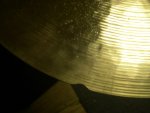Size of Crack
How big is the crack? It sounds like your is around 1/2" at this point from what you've said. Anyways, I've had lots of luck fixing my crashes. I've been playing a 18" paiste sig. full crash that I fixed for the last two years!
The following procedure works great for cracks that are under 1/8" long. The smaller the crack, the better your chances of it sticking around.
Get some sand paper. I usually buy a multi-pack with coarse, medium, and fine grit papers. Start sanding down the crack with the sand paper. Sand out the entire crack (this can take around an hour or longer depending on the length of the crack). I usually use the coarse paper for the majority of the sanding and then I use the finer papers to smooth out the metal and finish it off. When sanding the crack make sure that you create a smooth, gradual curve instead of a sudden, sanded chunk. After that, you are done. Voila! your cymbal should live on. Just to be on the safe side, I wouldn't smash the cymbal right in the spot where you sanded out the crack. I have tried this on about 10 crashes and 2 rides. All were either Paiste 2002's or Signatures. Only one crash continued to crack after I sanded it down. It also was the only one with a crack over a 1/4" long. I'm sure it would work on other brands and series, but it's probably safe to say that this technique would work better on larger cymbals (crashes,rides, not splashes and hats), however, it probably still works well as long as you are starting with a small crack.
In short, you can save your cracked cymbals. However, it is a lot of hard work and it is necessary that you stop playing the cymbal the moment that you see the crack starting beacuse the smaller the crack, the better when tryign to perserve the cymbal's sound and longevity.


